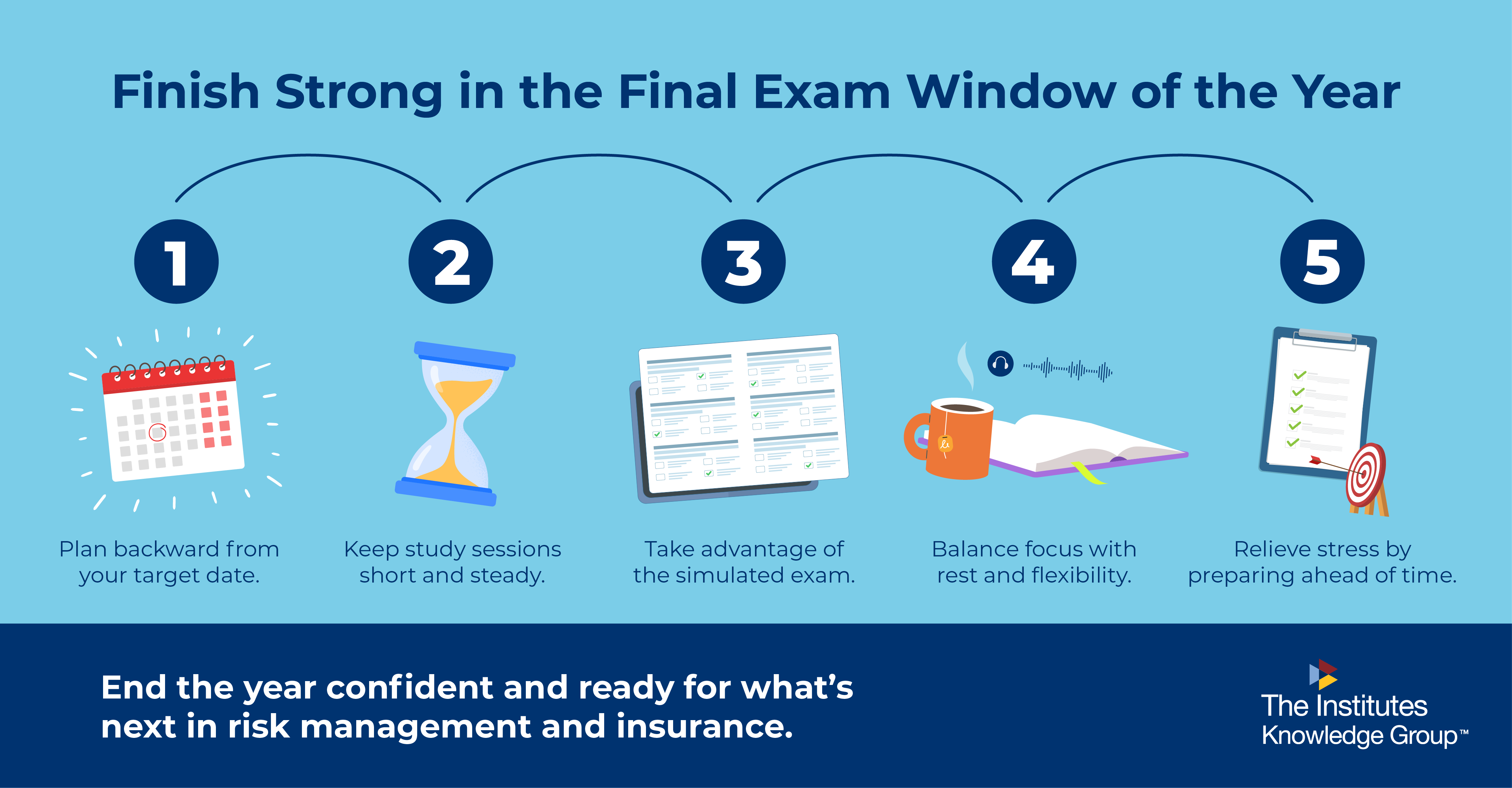Professional Development
How to Prepare for The Institutes’ Final Testing Window of the Year
From October 15 through December 15, the final testing window of the year is your last chance to complete an Institutes Designation course and end the year with a strong sense of achievement in risk management and insurance (RMI). But it also arrives during one of the busiest times of the year, when projects wrap up, holidays approach, and travel plans may fill your schedule.
So, whether it’s your first course or the last one you need to earn a credential, success during this season requires a focused yet flexible approach. The tips below will help you create a practical plan, maintain momentum through the holidays, and show up confident on exam day.

1. Start With Your Exam Date and Plan Backward
First, pick a date within the window of October 15 to December 15, then plan backward from there. Working in reverse helps you visualize how much time you have for each step, such as reviewing study materials, taking practice exams, and scheduling a lighter review in the final week leading up to your exam.
Mark any major work deadlines, family gatherings, and travel dates on your calendar first. Then, fill the open spaces with study sessions. This method keeps your schedule realistic and prevents conflicts that could derail your preparation. Aim to complete your main studying a week or two before exam day, giving yourself time for final review and some flexibility if you need to retake an exam within the same testing window.
2. Communicate Your Exam Goals Early
Next, let the people around you know about your exam goals well in advance. A quick conversation with your manager or family members can help protect your study hours and reduce stress when schedules inevitably fill up. When colleagues and loved ones understand your commitment to advancing your career, they're more likely to support your efforts during this busy season. Plus, they can help motivate you along the way!
3. Build a Steady Routine That Fits Your End-of-Year Schedule
According to research published by The Psychonomic Society in 2023, distributing your review across multiple sessions improves long-term retention of material compared to cramming study into one block. Consistency matters more than intensity. Aim for three short study sessions (20 to 30 minutes) and one longer review (60 to 90 minutes) each week. This steady rhythm keeps information fresh and helps you avoid last-minute cramming.
In addition, try to fit in reviewing study materials and studying habits to the routines you already have. Set goals to answer questions in the mobile app during your commute, discuss key concepts with colleagues over lunch, or tackle practice quizzes before bed. Some courses also include interactive exam practice questions and an AI Assignment Assistant to help weave studying into your schedule. When study time feels like part of your day instead of an extra task, it’s much easier to maintain.
Most importantly, reserve time for when you intend to complete the simulated exam, which reflects the style and structure of the actual exam questions. It’s an excellent opportunity to check your understanding, identify weak spots, and review course materials as necessary to build confidence on test day. Keep in mind that you can only take it once, so aim to complete it when you feel confident and ready after all assignments and quizzes.
4. Stay Flexible Through the Holidays
Create a travel-ready study kit that includes flashcards, a notebook, and noise-canceling headphones to help you focus. This portable setup allows you to review during short breaks or while traveling. Even a few minutes of focused review while waiting at the airport or between family events can reinforce your learning and keep concepts fresh.
However, remember that rest plays a crucial role in memory retention and focus. Try to:
- Build in short breaks every 30 to 50 minutes during study sessions.
- Take a brief walk or stretch between sessions to help you recharge and refocus.
- Prioritize getting quality sleep, especially in the week leading up to your exam.
If stress starts to build, try a short breathing or mindfulness exercise before studying. Even a one-minute breathing exercise can boost energy and concentration, according to a 2024 article in Psychology Today.
5. Expect to Apply Your RMI Knowledge
The Institutes Designations’ exams are designed to measure how well you can apply key principles to professional risk management and insurance situations—not just how much you can memorize. Expect questions that reflect real-world scenarios you might encounter in the risk management and insurance landscape.
Focusing on the educational objectives in your RMI course materials can help you understand how central themes connect to on-the-job situations. Again, if your course includes a simulated exam, use it to test not only your knowledge but also get a feel for the environment and your thought process under the exam conditions.
Tip: If a challenging question appears, mark it and return to it later. Maintaining forward momentum helps you stay calm, confident, and in control throughout your exam.
6. Stay Focused and Confident for Exam Day
The Final 48 to 72 Hours: Light Review Only
In the days leading up to your exam, focus exclusively on light review and confidence-building activities. Skim chapter summaries, run through your flashcards one more time, and revisit key practice questions you've marked. This is the time to reinforce what you already know, not overload your mind with fresh concepts.
Double-Check Your Setup
All Institutes Designation exams use virtual proctoring technology to ensure fairness for all students and maintain the integrity, value, and credibility of your achievements. Review the virtual exam proctoring guidelines and FAQs before exam day. Also, be sure to:
- Use this link to test your equipment at least 48 hours before your exam.
- Ensure you have a stable internet connection and the latest version of Chrome, Edge, or Firefox.
- Eliminate potential distractions from your testing space.
Taking care of these technical details in advance allows you to focus fully on demonstrating your knowledge during the exam.
Finish the Year Strong and Start the Next Even Stronger
This final testing window represents your chance to close out the year with pride and enter the new year with stronger skills in risk management and insurance. With a structured plan, flexible study habits, and a calm mindset, you can successfully balance the season's demands while taking the next step toward your designation. Your dedication during this busy season will help set you up for success in the year ahead, supported by The Institutes’ 115-year legacy of trust, purpose-driven education, and commitment to helping RMI professionals serve those in need.
For more study support, explore:
- What Are the Best Study Tips for Institutes Designations Exams?
- How to Study for Professional Exams While Balancing Work and Life

About the Author
Our Skills Edge Team brings together insurance researchers and subject matter experts dedicated to advancing knowledge in risk management and insurance. Backed by more than 115 years of experience as a not-for-profit, the team at The Institutes is committed to educating, elevating, and connecting people and ideas to create a more informed, resilient world.
